How will the EU respond?published at 07:26 GMT 16 January 2019
The BBC's Katya Adler assesses the EU's reaction to parliament rejecting Theresa May's Brexit deal.
Read MoreMEPs debated UK Parliament’s rejection of Theresa May’s Brexit deal
Michel Barnier told them risk of no-deal Brexit was greater than ever
Spanish PM Pedro Sanchez made speech on future of EU
He called for 'true European Army' and national vetoes on EU tax policy to be scrapped
Paul Seddon
The BBC's Katya Adler assesses the EU's reaction to parliament rejecting Theresa May's Brexit deal.
Read MoreHello and welcome to coverage of this European Parliament plenary sitting in Strasbourg.
First this morning, European Commission Brexit negotiator Michel Barnier joins MEPs to debate Brexit after MPs last night rejected Theresa May’s Brexit deal.
Following the vote, Commission chief Jean-Claude Juncker asked the UK government to “clarify its intentions as soon as possible”.
Leaders of the political groups in the assembly have previously insisted that the prime minister’s Brexit agreement cannot be renegotiated.
Finally tonight, MEPs are debating proposals to revise the EU’s globalisation adjustment fund - and rename it the 'European Fund for Transition’.
Member states can apply for grants from the fund to finance retraining schemes for workers laid off due to changes attributed to globalisation.
However that's where we leave our coverage from the European Parliament for this evening.
MEPs will be back tomorrow from 07.30 GMT for a 90-minute debate on Brexit - after the House of Commons this evening rejected Theresa May's Brexit deal.
Theresa May is expected to be defeated by MPs voting on the terms of her plan to leave the EU.
Read MoreMEPs are now debating an advisory report from the international trade committee about the EU’s trade deals with Colombia and Peru.
They will also debate a separate report on the trade-related aspects of the EU’s 2012 association agreement with Central America.
Debate on InvestEU fund
 European Parliament
European Parliament
Strasbourg
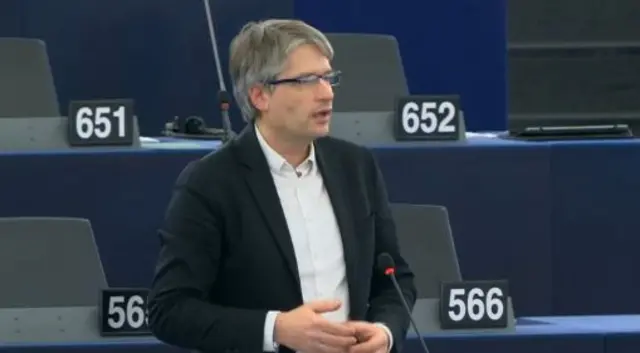 Image source, EBS
Image source, EBSGerman Green Sven Giegold says a target put forward by the committee for the proportion of investment that should go to sustainable projects must be kept.
He adds that there should be separation between EU investment in civil and military projects.
Catalan nationalist Jordi Sole says his Green/EFA group will be voting for a bigger sustainable investment target than that proposed by the committee.
He also says projects that are "environmentally harmful" should be excluded from investment.
MEPs are now debating legislation to set up a new investment fund called ‘InvestEU’.
The new fund would consolidate the existing EU’s flagship investment plan, launched in 2014, with other investment funds under a single legal framework.
The economic affairs committee has backed the legislation, and wants to extend the size of the loan guarantee provided from the EU’s budget.
The committee's proposals will be voted on tomorrow, ahead of further talks with national ministers.
 European Parliament
European Parliament
Strasbourg
 Image source, Reuters
Image source, ReutersMEPs are now debating an advisory report from the economic affairs committee about legislation implementing the so-called eurozone ‘banking union’.
The ‘union’ is a series of laws announced after the 2008 financial crisis to make financial institutions in those countries more resilient to economic shocks.
So far the EU has set common eurozone standards for the amount of reserve capital banks should have to hold, and given the ECB powers to directly monitor the largest Eurozone banks.
However plans to set up a eurozone-wide guarantee scheme to protect bank deposits have run into strong opposition from northern states, including Germany.
MLex Senior correspondent tweets:
Allow X content?
This article contains content provided by X. We ask for your permission before anything is loaded, as they may be using cookies and other technologies. You may want to read X’s cookie policy, external and privacy policy, external before accepting. To view this content choose ‘accept and continue’.
Debate on European Central Bank report
 European Parliament
European Parliament
Strasbourg
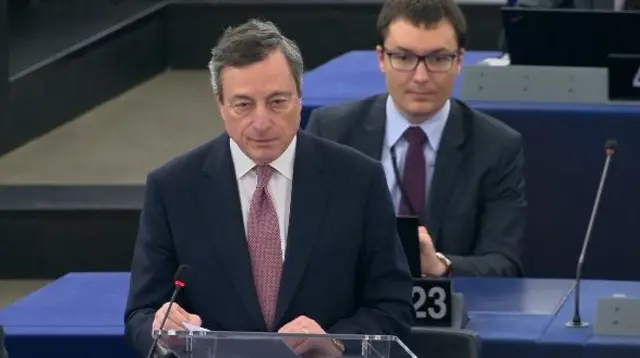 Image source, EBS
Image source, EBSMario Draghi tells MEPs begins with a nod to the 20th anniversary of the introduction of the euro, which he describes as a "quantum leap" in economic integration in Europe.
He says the ten years since the financial crisis in 2008 have necessitated a "very different monetary policy response" to the ten years preceding it.
He says this "evolution" in the Bank's policy has nevertheless been in the service of continuing to "deliver on its mandate" in response to "unprecedented threats".
Following his appearance earlier today, European Central Bank (ECB) chief Mario Draghi is back in the chamber to debate the ECB’s annual report, external for 2017.
Debate on Romania's EU presidency
 European Parliament
European Parliament
Strasbourg
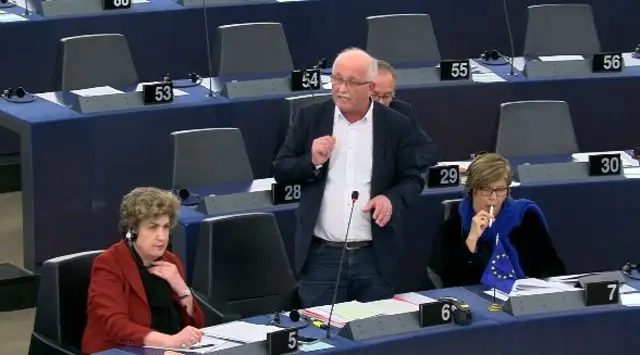 Image source, EBS
Image source, EBSGerman MEP Udo Bullman is the leader of the Socialist and Democrat group, which houses the 10 MEPs from Ms Dancila's social democrat (PSD) party.
He praises Romania for being one of eight EU countries that recently reached a deal with Malta to take in 49 migrants stranded at sea for weeks.
However he says corruption in the country "has to be combated", although he warns the fight against corruption cannot be used as a "club to batter the opposition with".
He says there should not be a "general amnesty" to settle corruption cases, but the "rule of law".
Debate on Romania's EU presidency
 European Parliament
European Parliament
Strasbourg
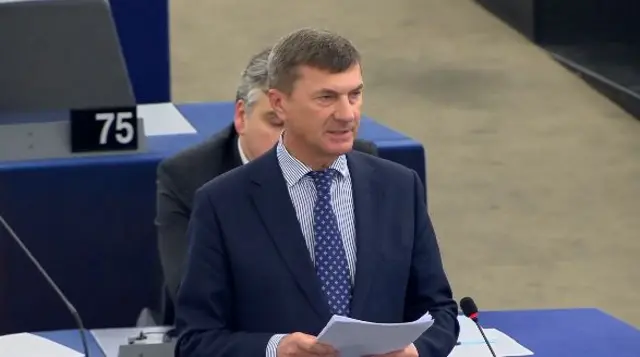 Image source, EBS
Image source, EBSNext up is Estonia's EU commissioner - and former Estonian prime minister - Andrus Ansip.
He says the European Commission is counting on the "leadership and stability" of Romania, as well as its ability to strike deals.
There are currently 242 legislative proposals tabled that have not yet been agreed, he says.
There is only a "short period of time" to agree proposals before the European Parliament rises on 18 April ahead of May's European elections, he adds.
Debate on Romania's EU presidency
 European Parliament
European Parliament
Strasbourg
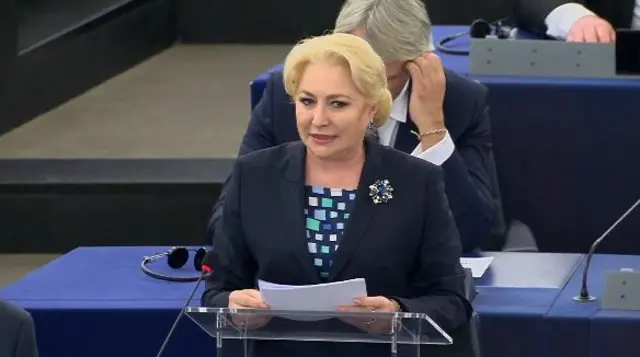 Image source, EBS
Image source, EBSRomanian Prime Minister Viorica Dancila says Romania has taken over the EU presidency at a "difficult juncture" for the European Union.
She says Romania hopes to shore up economic growth and decrease gaps between countries, and improve single market laws.
She says the country will also focus on improving "connectivity" between East and West Europe, and between the North and the South.
She says Romanians feel a sense of "inequality" in the EU because the country has not yet been allowed to join the passport-free Schengen area.
She also says Romania has been criticised for things "that in other states are seen as natural".
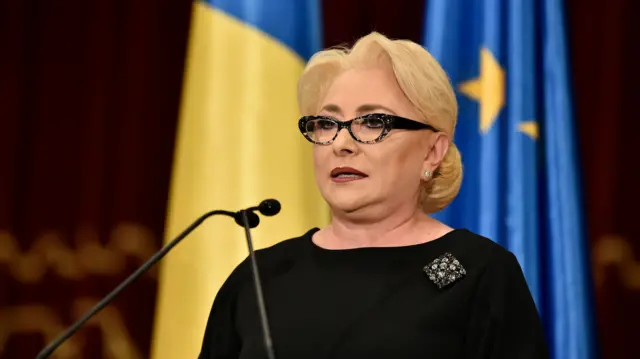 Image source, EPA
Image source, EPAHello and welcome back to coverage of this plenary sitting of the European Parliament.
First up this afternoon, MEPs will be joined by Romanian Prime Minister Viorica Dancila, who will outline her country’s priorities for its upcoming stint in the rotating EU presidency.
Romania has this month taken over the reins from Austria.
The Romanian government, a coalition between Ms Dancila’s social democrats and a liberal party, has clashed with the EU over its planned changes to the judiciary.
The government has faced protests amid claims the changes will undermine efforts to tackle corruption in the country.
That’s the voting session finished.
MEPs will now get the chance to make short speeches explaining how they voted.
Voting session
MEPs give their approval to changes to the management structure of the European Investment Bank (EIB) to reflect the departure of the UK after Brexit.
The EIB lends money for infrastructure projects, mostly from funds raised on the international capital markets through issuing bonds.
Under the revised rules, the number of EIB directors will be reduced from the current 29 to 28.
The UK will also be taken off the list of shareholders in the Bank, and the scope for using qualified majority voting on the board will be increased.
Voting session
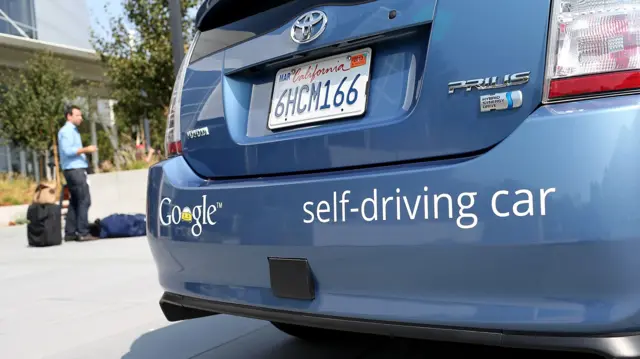 Image source, Getty Images
Image source, Getty ImagesMEPs approve an advisory report drawn up by the transport committee on the “significant potential” of the driverless car industry.
It calls on the European Commission to devise an EU-wide strategy and rules for on-board computers which can communicate with each other.
It also highlights the urgent need to provide legal certainty to users and manufacturers about the conformity of driverless cars with existing data protection rules.
That’s the speeches on the anniversary of the euro finished.
MEPs are now taking their seats for today’s voting session.
Speeches marking 20th anniversary of euro
 European Parliament
European Parliament
Strasbourg
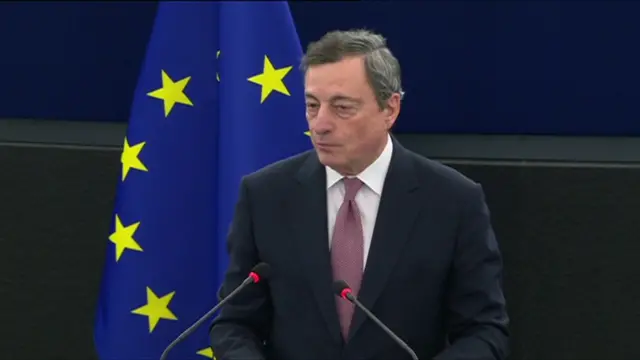 Image source, EBS
Image source, EBSEuropean Central Bank (ECB) President Mario Draghi says the euro has brought "two decades of price stability" to countries where this was not previously the case.
However, he says not all countries have "realised in full" the benefits of the single currency - adding that the eurozone's architecture "remains incomplete".
Speaking after him, Jean-Claude Juncker says the euro was a "peace project as well".
He adds though that EU countries perhaps "should have done done more" to co-ordinate their economic policies, and "too much importance" was given to the IMF during crises.